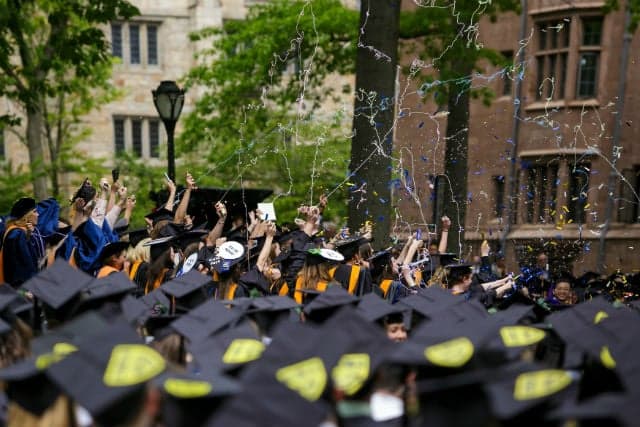What’s the real impact of attending a top university?
What’s in a name? Does it really matter whether your child goes to Harvard, stays in Switzerland, or takes an online course at an unheard-of university? You can probably guess the answer.

The top universities in the United States, like Harvard, Stanford and Yale, and the United Kingdom, such as Oxford and Cambridge, are ranked among the best in the world and for good reason.
They offer first-class curriculums and the professors often are world leaders in their field, sometimes even writing the programme’s required textbooks, not to mention the well-funded facilities designed to aid learning.
“The top universities in the US and the UK are the best in the world,” says Rowan Anders, Director of Crimson Education in Switzerland, who has himself attended an Ivy League university. “From access to cutting-edge research, internship programmes and full-time job opportunities, they offer very powerful advantages.”
Founded in 2013, Crimson Education is a global mentoring company that specialises in building the candidacy of high school students applying to top universities in the US and the UK.
Through personalised education, such as mentoring focused on essay writing, entrance exams, and extracurriculars, a network of specialists help students to realise their potential and win over university admission teams.
.jpg) Photo: Crimson Education
Photo: Crimson Education
“The missing link for many students in Switzerland is the support and know-how to realise that studying at a top university in the US or the UK is a realistic opportunity for them. That’s why we are here,” says Anders.
What is a 'top university’?
There are many university ranking systems, but the top universities remain fairly consistent. Many factors contribute, but generally, student satisfaction and employability, including salaries of graduates, are the most relevant for both students and parents.
Just 5-10 percent of an annual pool of 35,000 applicants are offered places at top universities. These students commonly represent a range of diverse backgrounds, have impeccable academic records, and show evidence of perseverance and determination. This makes them among the brightest and most ambitious in the world.
“Universities in the US look for well-rounded candidates who have demonstrated academic competency and an ability to make an impact outside their community, while universities in the UK look for scholars in a particular subject who have already demonstrated excellence both inside and outside the classroom,” says Anders.
And what’s more, once they’re in, students are less likely to drop out before completing the course. Around 90 percent of students at top universities in the US go onto graduate, while that same figure hovers between 80-85 percent in the UK. This is in strong contrast to the Swiss university system where 40-60 percent do not complete the degree they begin.
 Photo: Crimson Education
Photo: Crimson Education
Anders adds that the culture of living on campus in these countries also gives students important exposure to responsibility and independence, all while in a controlled and supported environment.
“This builds a huge amount of character in students who are undergoing major personal development. The exposure to different interests in terms of clubs, hobbies, travel, and so on, also opens their minds to worlds of possibilities they didn’t have at home.”
Alumni networks, too, are a powerful tool for young graduates to have in their toolbox. Lasting decades beyond graduation, these connections often help people to find jobs and business opportunities throughout their careers. At the top universities, this network is truly global and gives alumni the ability to work internationally in an ever-evolving global economy.
Better return on investment
Attending a top university provides students with so much more than a world-class education. It lays the foundation for a long and successful career which pays for itself time and time again.
Students at top universities are first to be scouted for coveted internships, mentorships, and partnerships. All of these are incredibly useful for life beyond university and can open doors that may otherwise have remained closed.
Find out how Crimson Education can help your child get into a top university
What’s more, there are some jobs, says Anders, that students can only get if they have attended a top university.
“Lots of finance jobs, investment banking at prestigious firms, for example, or private equity, trading and venture capital, are near exclusively filled by graduates of top universities. This is also the case at many management consultancy firms and the world’s top tech companies.”
Additionally, moving onto a prestigious masters programme is much more likely when a student has already obtained an undergraduate degree from a top university.
Are top universities reserved for higher income families?
“Definitely not,” says Anders. “There are many scholarships for outstanding academic students in the UK and need-based financial aid at US universities that endeavour to make university possible for students of all socioeconomic backgrounds.”
Financial aid packages and scholarships come in many forms, you can read more about the various options on Crimson Education’s blog.
Graph: Crimson Education
Click here to find out more about how Crimson Education can help your child to get accepted to a top university, and start laying the foundations for their future success.
This article was produced by The Local Creative Studio and sponsored by Crimson Education.
This content was paid for by an advertiser and produced by The Local's Creative Studio.

Join the conversation in our comments section below. Share your own views and experience and if you have a question or suggestion for our journalists then email us at [email protected].
Please keep comments civil, constructive and on topic – and make sure to read our terms of use before getting involved.
Please log in here to leave a comment.